The 2024 annual Retailers Against Crime (RAC) Glasgow conference took place in September, marking another pivotal event in the ongoing fight against retail crime.

This year's conference brought together a wide array of experts, law enforcement officers, and industry leaders to discuss the latest trends and solutions around retail crime, data sharing, anti-social behaviour, and cybercrime. It was a packed event with high-profile speakers and informative presentations, addressing the most pressing issues facing the industry today.
Hosted by local Glasgow presenter, Greg Summers, the conference opened with an engaging tone, setting the stage for what would be an enlightening day of discussion.

Summers, a well-known figure in the Scottish events community, managed the flow of the event expertly, ensuring that each speaker's key message was delivered clearly, concisely and on time.
Opening Remarks and Overview of RAC’s Progress
The event began with Maxine Fraser, RAC’s Managing Director, delivering a comprehensive overview of the organisation’s efforts over the past year. Fraser highlighted the crucial role RAC has played in combating retail crime, with particular emphasis on new Business Improvement Districts (BIDs) and crime partnerships that have joined RAC in recent months. She expressed optimism about the growing number of businesses coming together to tackle retail crime collaboratively and welcomed new members to the scheme.
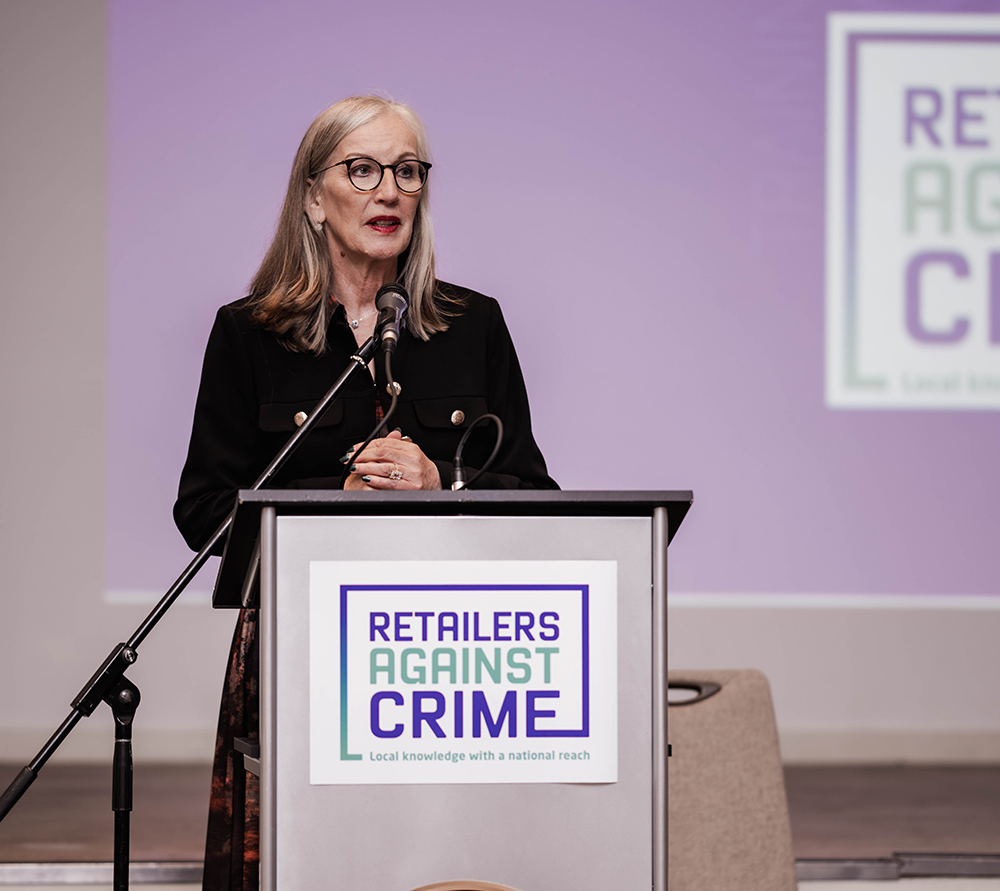
Fraser also presented a sobering summary of retail crime statistics from the past year. She reported that, despite the challenges posed by increasing criminal sophistication, RAC has made significant strides in addressing retail crime threats with RAC’s members. The organisation’s collaborative approach with local and national law enforcement, private security, and retail businesses continues to be instrumental in reducing incidents of shoplifting, theft, and anti-social behaviour.
Summary of Online Crime Reporting Pilot scheme in Fife
Assistant Chief Constable Tim Mairs took the stage to discuss the collaborative efforts between SentrySIS, RAC, and Police Scotland, particularly focusing on a pilot scheme in the Fife Police area. This initiative allows national retailers to report shoplifting online directly to Police Scotland, streamlining the reporting process.
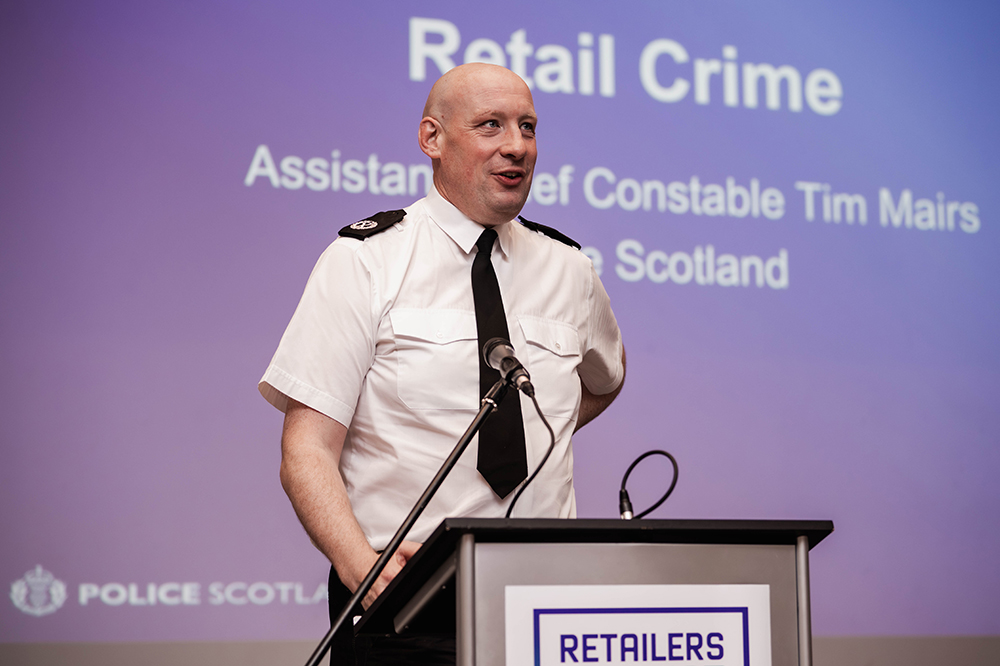
Mairs emphasised how the pilot is not only a significant step forward in tackling retail crime but also a pioneering example of how digital solutions can improve efficiency in law enforcement operations. The system simplifies communication between retailers and police, enabling quicker responses and more accurate investigations. Mairs explained that the online reporting tool via SentrySIS offers several key benefits:
- Increased efficiency: By allowing businesses to report crimes digitally, the process is faster and more convenient, reducing the administrative burden on both retailers and law enforcement.
- Wider access: Based on the outcomes of the current pilot, there are plans to roll out the system across Scotland improving the crime reporting across different regions.
- Resource optimisation: With quicker and more accurate crime reporting, Police Scotland can allocate resources more effectively, improving response times and overall crime prevention efforts.
The pilot in Fife is anticipated to set a new standard for crime reporting, with potential for expansion into other regions and inviting more national retailers to the scheme, in the future.
Police Scotland’s DESC System: Digital Transformation in CCTV Evidence Collection
Sgt. Chris Edwards of Police Scotland was next to take the stage, presenting the audience with an overview of Police Scotland’s new Digital Evidence Sharing Capability (DESC) system. This innovative platform marks a major step forward in the digital transformation of the force, allowing businesses, witnesses, and victims of crime to easily submit CCTV footage and other digital evidence directly to the police.
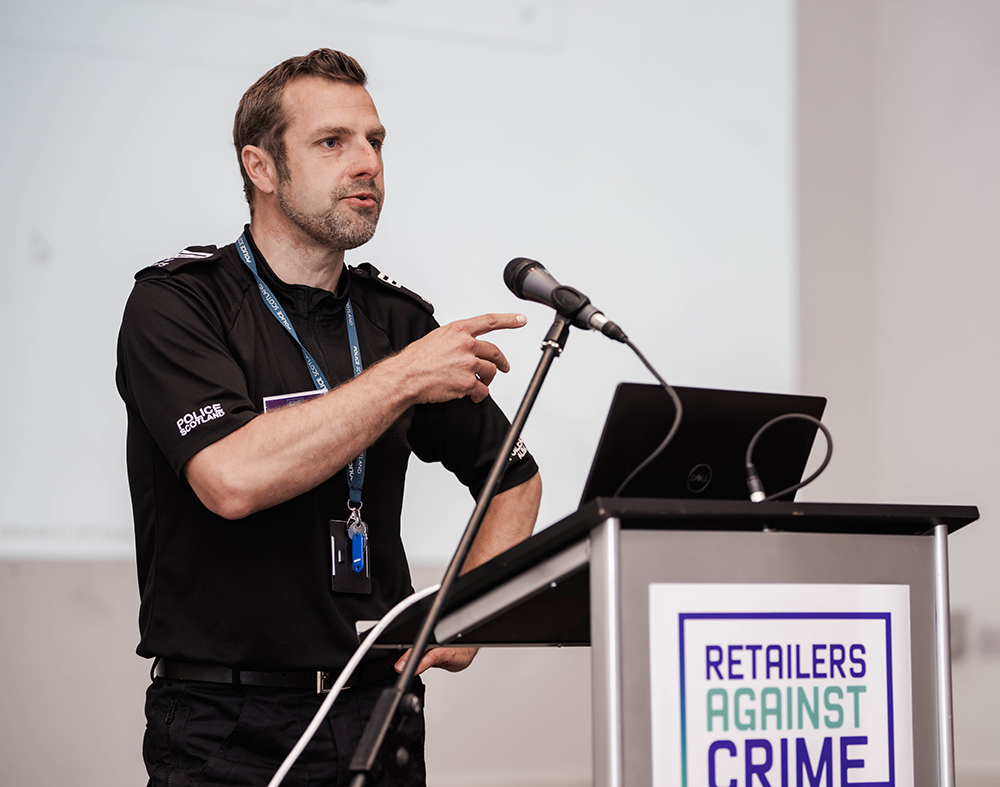
Edwards emphasised how the DESC system streamlines the CCTV transfer process, significantly reducing the time it takes for users to send CCTV and other video files to the police to investigate. This initiative is expected to enhance the speed and accuracy of investigations, enabling law enforcement to respond to investigations much more efficiently and improve the speed up the time it takes to investigate some cases. As CCTV becomes increasingly popular and essential for evidence, systems like DESC will play a vital role in modernising the way police collect and handle digital evidence.
Facial Recognition and Retail Security: A New Era
Nick Fisher, representing the UK's leading facial recognition platform, Facewatch, provided a compelling presentation on the growing role of facial recognition technology in retail crime prevention. He discussed how national retailers are leveraging this cutting-edge technology to deter shoplifting and other forms of theft. Facewatch allows businesses to recognize individuals who are known offenders, thereby preventing them from entering the premises and potentially committing further crimes.

Fisher explained that while facial recognition technology has sparked some controversy regarding privacy concerns, many retailers have embraced it as a necessary tool for safeguarding their assets and improving the safety of their staff and customers. Fisher also discussed the close working relationship Facewatch have with the Information Commissioners Office and how they are helping shape policy across the UK. As the technology becomes more widely adopted, its potential to drastically reduce incidents of retail crime could reshape the retail landscape.
Tackling Retail Crime with SentrySIS: A Collaborative Approach
The next speaker, Chris Nriapia from SentrySIS, added further detail to the joint venture between SentrySIS, RAC, and Police Scotland and online crime reporting. This initiative focuses on the tools available within SentrySIS, allowing national retailers to report shoplifting incidents and other crimes directly to the police in real-time.
By integrating digital evidence submission and crime reporting into a single, streamlined platform, this initiative increases the efficiency of reporting while ensuring that law enforcement receives all relevant information promptly. Nriapia emphasised how this collaboration is helping to close the gap between retailers and law enforcement, enabling quicker response times and more effective crime prevention strategies.
The Role of Private Security in Retail Crime Prevention
Brendan Musgrove and Peter Fisher, from the conference’s headline sponsor Argenbright Security / ASEL, delivered an insightful presentation on the pivotal role private security companies play in combating retail crime. With the rise of organised retail crime syndicates and increasingly brazen shoplifters, the demand for robust security measures has never been higher.
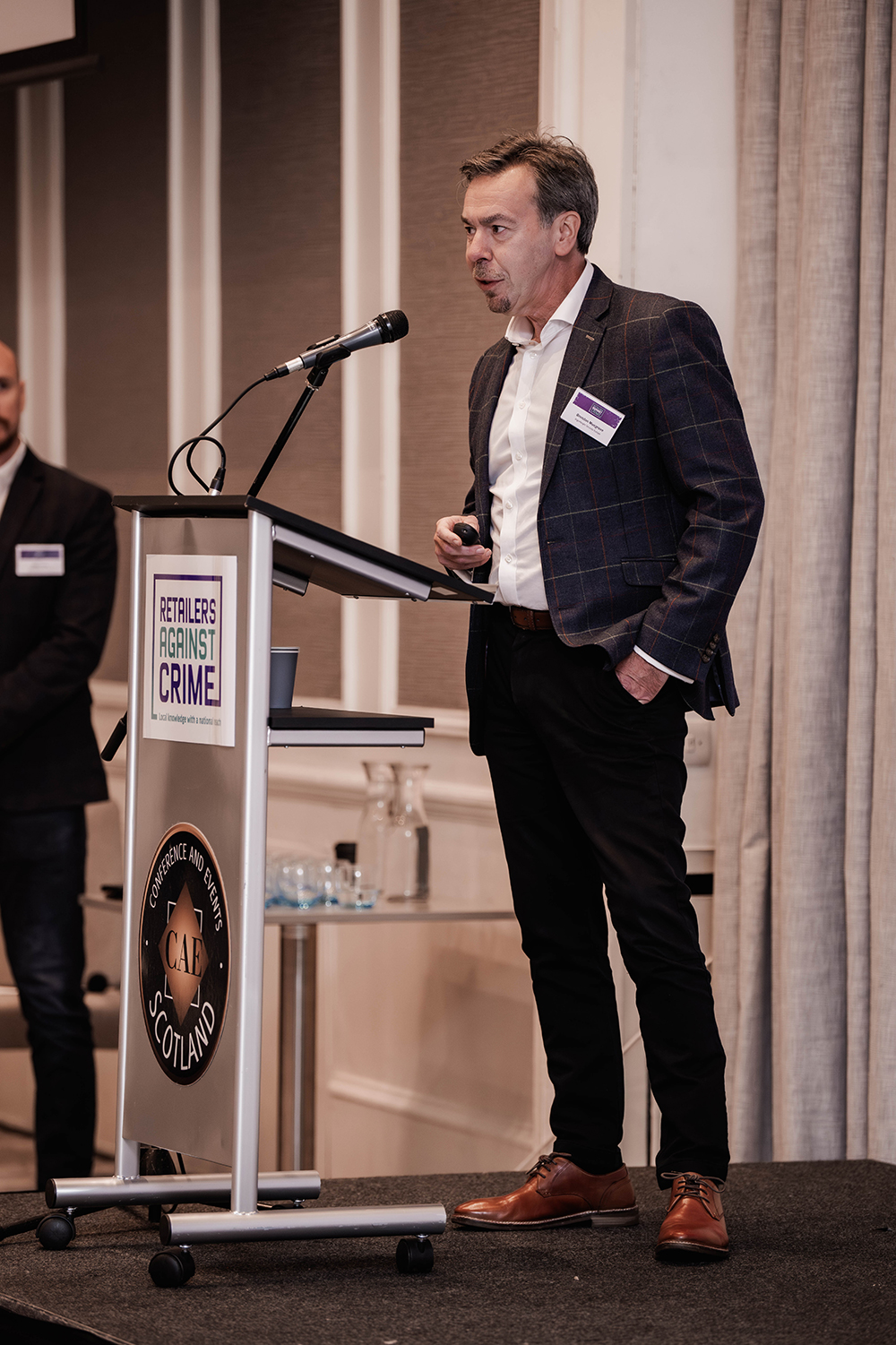
Musgrove and Fisher highlighted how private security firms are evolving their services to meet the changing needs of the retail industry. From offering more sophisticated surveillance systems to deploying specially trained security personnel, the private security sector is becoming an indispensable part of the broader retail crime prevention strategy.
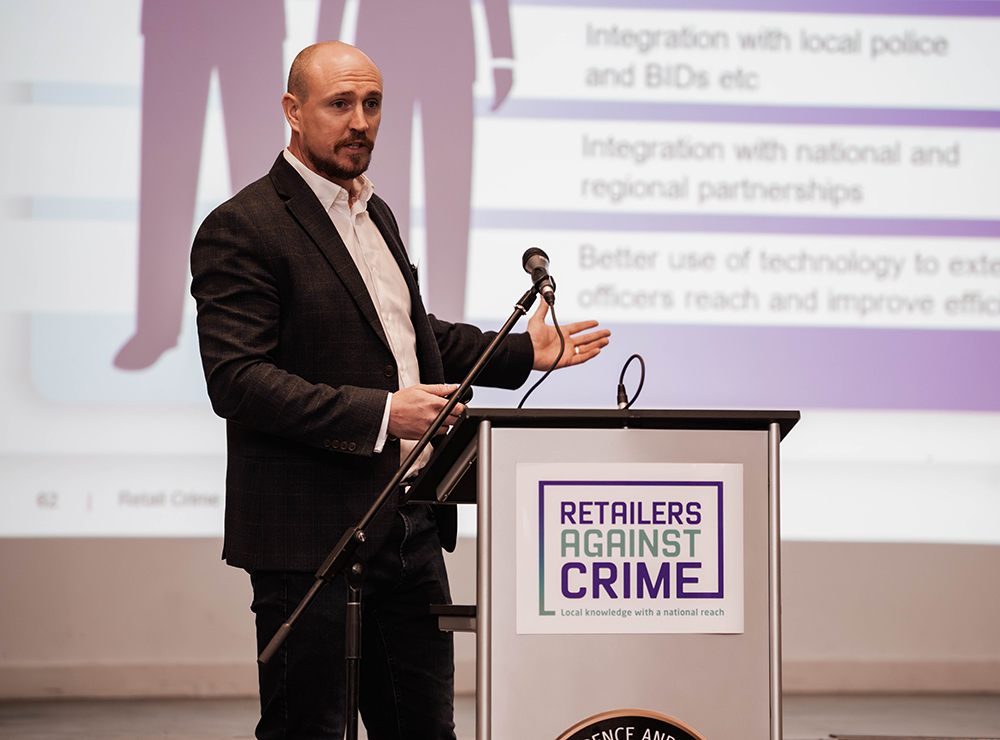
They stressed the importance of collaboration between private security firms, law enforcement agencies, software companies and retail businesses to effectively combat both in-store theft and external threats.
Addressing International Crime in travelling offenders
The conference also heard from Sally Poole of the Immigration Compliance & Enforcement Team at the Home Office. Poole focused on the issue of international traveling offenders and shared updates on what the Home Office is doing to tackle crime committed by individuals who travel across borders to target UK retailers. International crime syndicates, often highly organised, have become a growing concern for retailers, as they can quickly move between jurisdictions, making them difficult to track.

Poole explained how cooperation between different countries' law enforcement agencies, combined with the use of advanced surveillance technologies, is crucial to curbing this trend. The Home Office continues to work on policies that make it easier to track and apprehend these offenders.
A day in the life of a community police officer
PC Alistair Hope from Police Scotland offered a more localised perspective, providing an engaging overview of “a day in the life of a community police officer.” Hope’s presentation was an eye-opener, revealing the wide range of issues officers face on a daily basis—from dealing with anti-social behaviour to handling theft and shoplifting incidents.

He spoke passionately about the importance of building strong relationships with local communities, as community trust is a vital asset in preventing crime.
Loss Prevention and shoplifting
Marc McCabe from Waterstones shared valuable insights from his work as a Senior Loss Prevention Investigator. McCabe discussed the various challenges retailers face in minimizing shrinkage due to shoplifting and internal theft.

His presentation summarised the need for retailers to adopt a multi-layered approach to loss prevention, combining physical security measures with staff training and technological solutions such as surveillance systems.
Retail Crime and Convenience Stores
The conference also saw the relaunch of the “Don’t Put Up With It” campaign, supported by Dr. Pete Cheema OBE of the Scottish Grocers Federation. This campaign encourages smaller retailers to report crimes and anti-social behaviour to the police, rather than viewing these incidents as part of the job.
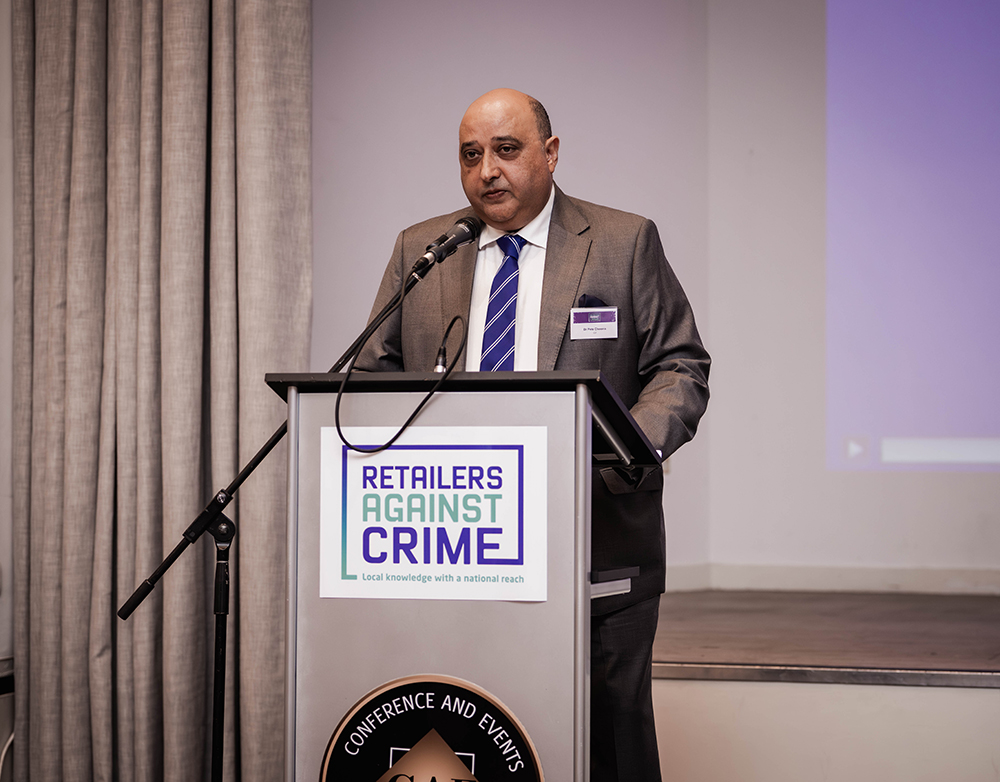
Cheema stressed that consistent reporting is critical to helping law enforcement gather accurate data on crime trends, which in turn enables them to allocate resources more effectively but also helps protect lone worker stores or small independent outlets.
The Security Industry Association and how to make it better
Julie Barwick from the Security Industry Authority (SIA) provided an insightful overview of the association's ongoing efforts to elevate training standards and best practices within the security sector. Barwick highlighted the crucial role the SIA plays in ensuring that security personnel are well-equipped to meet the evolving challenges of the modern retail environment, especially in combating retail crime, anti-social behavior, and other threats to businesses.
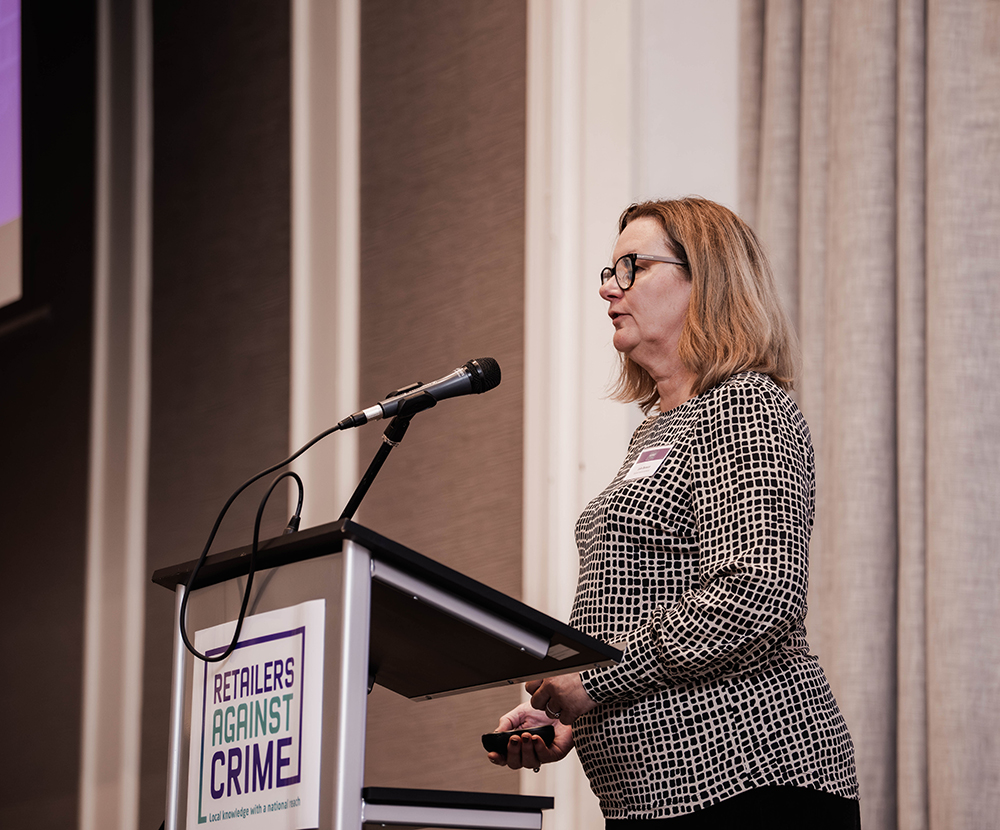
Julie covered areas such as Enhanced Training Programs, Accreditation and Standards, Collaboration with Retailers and Greater Industry Collaboration.
Cybercrime and Online Security: Preparing for Digital Threats
Stephen Franklin from Cyberlock rounded out the presentations with an overview of the latest developments in cybersecurity. With cyberattacks on the rise, Franklin's presentation was a timely reminder that retail businesses must prioritise their online security as much as their physical security.

He covered essential topics like phishing attacks, ransomware, and data breaches, providing practical advice for retailers on how to safeguard their businesses against these threats. As more retailers adopt e-commerce platforms and cloud-based systems, the potential vulnerabilities grow, making cybersecurity an essential component of any modern retail crime prevention strategy.
Celebrating Achievements and Looking Ahead
The RAC Glasgow conference concluded with the presentation of the RAC Awards by Maxine Fraser and Stephanie Karte. These awards celebrated the outstanding contributions of RAC members and their teams, recognising their dedication to preventing retail crime and promoting safer business environments.

Overall, the RAC Glasgow conference 2024 was a resounding success, offering valuable insights into the evolving nature of retail crime and the innovative solutions being developed to combat it. The diverse range of speakers, from law enforcement officers to cybersecurity experts, highlighted the importance of collaboration across sectors to address the challenges retailers face today.
As retail crime continues to evolve, the insights shared at this year’s conference will undoubtedly shape the strategies businesses adopt to protect their assets and ensure the safety of their staff and customers.